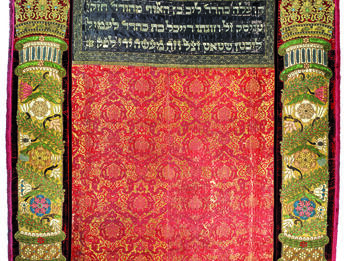Statutes
- No one shall seek permission to become a master, unless he has it in writing from the Jewish Elders of Prague that he is native of the place, and he shall previously furnish the Jewish Elders with a testimonial by guild Wardens to his [good] conduct.
- After a [journeyman] has received permission in writing from four Wardens to become a master, he shall not take an apprentice for at least one year after his marriage but shall employ one journeyman only. At the end of the year he may take one apprentice, but not more.
- If a [journeyman] wishes to become a master, he must present himself at the Wardens’ office and be inscribed in the guild book, which act shall be witnessed by the signatures of all the guild officers. Likewise, when an apprentice is admitted [to the guild] the several Wardens shall subscribe their signatures.
- If a tailor is about to take the measure [of a patron], either in or outside the ghetto, and another tailor happens along, the latter shall immediately leave, but if he does not leave and tries to get the work for himself, he shall be liable to a fine of no less than two ducats, to be paid into the treasury of the Prague Jewish community.
- The Warden of the month shall call a meeting of the Guild officers every Sunday on pain of incurring a fine of no less than 45 kreutzer, to be paid into the Guild treasury.
- No one shall hold the office of Warden of the month longer than four weeks, on pain of paying a fine of one ducat into the treasury of the Prague Jewish community. If the Warden of the month has laid out money to defray certain expenses during his tenure of office, he shall not yield his office until his successor has reimbursed him for these payments.
- When a Warden of the month relinquishes his office, the majority of the Wardens must witness this by their signatures, otherwise it is not valid.
- If a tailor has a dispute with another tailor regardless of the matter [pertaining to the craft], they shall appear before the Wardens of the Guild to hear the verdict; but if one or the other refuses to abide by the verdict, he shall deposit a pledge of half a schock with the Warden of the month whereafter he shall have 24 hours to appeal to the starsi [superior wardens].
- When a tailor hires a journeyman, he shall try him for a period no longer than three days on pain of paying a fine of two ducats into the treasury of the Jewish community, after which he shall have the journeyman registered in the Guild book, each party being required to pay a fee of 24½ kreutzer, or a total of 49 kreutzer.
it is deemed right that all disputes concerning complaints of a Prague Jew [customer] of being overcharged by a tailor, or being asked to supply more [material] than is necessary, shall be settled by the Warden of the Guild sitting together with a representative of the Prague Jewish community appointed by the chief inspectors [of the Taendelmarkt]. In the event that the Prague Jew is not satisfied with the decision, regardless of whether he is justified or not, one or two Jewish judges shall be appointed to settle the dispute. - Every tailor who takes an apprentice to assist him, shall instruct him fairly in the craft as it is customarily practiced, so that the latter after his years of apprenticeship may become a journeyman.
- Should it be found that an apprentice has not been taught the trade as it is customarily practiced, his master shall not only return the apprenticeship fee, but shall be forbidden to take another apprentice for a period of three years.
- But, if a master has taught his apprentice the trade as it is customarily practiced, he shall be forbidden to take a new apprentice for a period of one year only [on pain of paying a fine of one ducat].
- A master has the option of keeping a journeyman whom he has trained for three years; the latter, for his part, shall have the option [to leave] after one year, unless his master pays him as high a wage as he is offered by another master.
- A journeyman shall work six years for a master before he is permitted to marry. By applying to the elders of the Prague Jewish community for permission to marry he shall produce a testimonial to his good conduct from the Wardens of the Guild.
- A journeyman who is betrothed shall work for his master until his wedding day, even if he was working on his own wedding clothes.
- Every journeyman is required to attend shul [synagogue] every day, especially on Mondays and Thursdays
- Also, every journeyman and every apprentice shall have half an hour free to learn how to write.
- Journeymen and apprentices shall work from 6 [am] to 8 [pm], as is the custom.
- A journeyman when contracting to work for a master shall pledge to the Guild secretary his word that he will work faithfully and trustfully.
- If a journeyman or an apprentice falls ill during his term of service, all the expenses involved shall be borne by his father.
- If an apprentice dies, the partial payment which the master has already received shall be returned and the money still due him shall be foregone.
- A foreign journeyman coming [to Prague] shall not go to work in a shop until he first reports to the Warden of the Guild. A master [hiring a foreign journeyman] shall also report.
- No journeyman shall seize in pledge any of his master’s property [for payment of his wages], but shall make a request in the regular way. Should he do it through ignorance, the pledge shall be deposited with the Warden of the month.
- At the decision of the Wardens, no one shall be the secretary unless he has been married at least two years; no one shall be an elector who has not been a secretary, and no one shall be a Warden who has not been married at least ten years.
- Newly elected Wardens are authorized with the concurrence of the Chief Inspectors to draw up a list of future expenditures.
It is deemed proper that all masters, journeymen, and apprentices should assemble every Sabbath to attend a lecture on Scriptures given by the Guild preacher. Each absence shall be penalized by a fine of half a liter of candles to be donated to the shul.
Lasser Bezallels
Beer Juda
Moyses Juda
Simone Ausch
Juda Loebl
Loebl Brandeis
Moyses Wehle, Guild Secretary
Notes
Words in brackets appear in the original translation.
Credits
Tailors’ Guild of Prague, “Statutes of the Jewish Tailors’ Guild of Prague, 1690,” trans. Mark Wischnitzer, excerpt from Mark Wischnitzer, A History of Jewish Crafts and Guilds (New York: Jonathan David, 1965), pp. 283–85. Sponsored by Yeshiva University and The Conference on Jewish Social Studies. Copyright 1965. Reproduced by arrangement with Jonathan David Publishers, Inc., www.jdbooks.com.
Published in: The Posen Library of Jewish Culture and Civilization, vol. 5.




